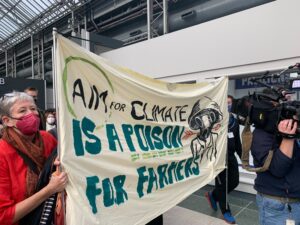NOVEMBER 12, 2021
Glasgow, Scotland – As the United Nations Conference of the Parties on Climate Change (COP26) nears its conclusion, the National Farmers Union (NFU) calls the Government of Canada to action. We implore policymakers to live up to their non-binding pledges and ensure they address the climate crisis by reducing actual emissions and not with net-zero schemes based on unproven technology, market-based solutions, misunderstood carbon sequestration science, and the further commodification of land.
Many farmers and Indigenous Peoples from the Global South were excluded from COP26 due to vaccine inequity and COVID-19 restrictions. Thus, those most directly affected by the climate crisis have had their voices and solutions silenced by this exclusionary process.
Still, the final day of COP26 was dominated by the Peoples Plenary, an inter-constituency coalition of civil society and advocacy groups calling attention to COP26’s inequities and giving voice to the people-powered solutions sidelined by its corporate greenwashing. In a collective action, hundreds of accredited delegates walked out of the formal assembly space on Friday to protest alongside those outside.
“This was my first COP experience, but the exclusion of participants from the Global South was extremely obvious and problematic,” said Jessie MacInnis, part of the NFU’s delegation. “For civil society folks who did make it to Glasgow, it was difficult to access plenaries, negotiations, and side events to meaningfully engage in the processes. For example, La Via Campesina normally sends a significant delegation of farmers and peasants from around the globe, but the vaccine apartheid and visa challenges did not allow for this. Their voices were sorely missed and cannot be left behind. The whole conference felt exclusionary and fraught because there were so many crucial perspectives missing from the table.”
In spite of its emissions contributions and its potential to be a lead sector addressing the climate crisis, Agriculture was lamentably low on the COP26 agenda and related initiatives, and pledges that did result were corporate-centered and excluded farmers’ voices. Climate Shot and Agriculture Innovation Mission for Climate (AIM4C) both promote corporate-led, high-tech ‘silver bullet’ solutions, co-opting the language of agroecology while perpetuating the climate crisis. The Updates to the Koronivia Joint Work on Agriculture exclude the food sovereignty and agroecology principles grassroots farmer leaders have been pushing for in this and previous COPs. Technology certainly plays a role in agricultural solutions to the climate crisis, but it must be farmer-led, open-source technology aimed at reducing emissions. Reducing agricultural emissions while ensuring higher net incomes for farmers must be at the core of agricultural climate solutions.
Canada’s Minister of Environment and Climate Change, Steven Guilbeault, admitted that agriculture was not as prominent in COP26 as it might have been, and has promised to “do some homework on that front.” The NFU’s COP26 delegation will seek clarification from the Minister, and continue to press Canada for effective agricultural climate action.
The majority of the world’s wealthiest nations have committed to reach net-zero emissions by 2050. However, Indigenous groups and civil society organizations oppose these nation’s proposed actions as false solutions that allow further pollution. The ‘real zero’ solutions championed by the People’s Plenary are based on an understanding that the wealthiest states have contributed the majority of fossil fuel emissions and must provide reparations and adaptation financing to developing nations.
The time for rhetoric without action is over. Canada must be a proponent of solutions rooted in science over profit, reconciliation over commodification, decolonization over exploitation, and agroecology over corporate profits. As COP26 concludes, Canada’s track record will be shaped by the actions of its government tomorrow and in the months to come.

